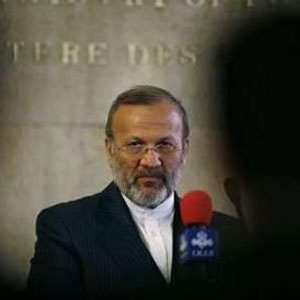Mottaki and Sarkozy in Baghdad. Coincidence?

Leading a delegation of oil and banking officials, the Iranian FM Manouchehr Mottaki, has made a visit to Iraq to follow the agreements between Iran and Iraq during Iraqi PM Nuri Maleki’s trip to Iran. He also chaired the joint Iranian-Iraqi committee formed after the agreement. This, according to news, was "a part of" Mottaki’s plans during his visit.
For a closer look, let’s go back to Obama’s remarks in his Monday night press conference, where he talked of seeking opportunities for direct talks with Iran. For this, Iraq is the handiest option. Although Tehran’s negotiations with Europe and Washington on Afghanistan will be another topic of future talks, Iraq is far more important considering Iran’s interests in Iraq and its influence on Iraqi groups.
The American president has spoken of years of mistrust between Iran and America and the difficulty of getting over this problem; however, US efforts show how important and serious Iran is for the superpower. Obama’s direct words on Monday night: "My national security team is currently reviewing our existing Iran policy, looking at areas where we can have constructive dialogue, where we can directly engage with them ".
Iraq is as much a chance for Iran-US (in)direct talks as much as it is a fertile ground for terrorists. Both countries’ inclination [for negotiation] is not a secret and diplomats from both countries increasingly stress the necessity for negotiations to take place.
As much as Obama seeks a chance for face-to-face talks with Iran, Iran also unveils its will in various wordings. Obama says: "In the coming months, we will be looking for openings that can be created where we can start sitting across the table, face-to-face" and Ahmadinejad responds: "The Iranian nation is ready for talks, but in a fair atmosphere with mutual respect ". Obama states: "Now it’s time for Iran to send some signals that it wants to act differently, as well, and recognize that, even as it has some rights as a member of the international community, with those rights come responsibilities" and the Iranian President replies: "The new U.S. administration has announced that they want to produce change and pursue the course of dialogue. It is quite clear that real change must be fundamental and not tactical. It is clear the Iranian nation welcomes real changes".
Iran and United States have already started talks, though these seem more like ’conversations’ acting as a prelude to the real talks. Both countries persist on their contradicting rights and demands. In fact, one’s demand is the other’s red line. In his press conference, Obama criticized Iran’s support for Hezbollah and Hamas and its anti-Israel stance. He also dubbed Iran’s nuclear program a threat, following the frequent attempts to ruin Iran’s face in Middle East. On other hand, Ahmadinejad indirectly responded Obama stating: "If you truly want to fight terrorism, put those behind the recent wars in the Persian Gulf and the Middle East, on trial and sentence them together…Mr. Bush, his allies and government, have to be put on trial and sentenced".
Back to Mottaki, he visited Iraq the same day as Sarkozy. On the other hand, according to Iraq officials, Sarkozy bears the mission to pursue Tehran-Washington talks. The Iraqi officials have revealed that during his visit to Iraq, Sarkozy has had talks on Tehran-Washington negotiations.
The course of events can neither be regarded coincidental nor be looked through a conspiracy theory lens. However, the tones sound familiar. Ahmadinejad responds to Obama. Sarkozy is appointed to follow archenemies’ negotiations and the Iranian FM makes a visit to Baghdad in the same day as the French President. The changes have occurred only one week after the Munich Conference. So we have to wait and see what happens up to the end of Ahmadinejad’s term and how will the obstacles give room to progress?
The only unclear point here is how suitable Sarkozy is for prompting Iran-US negotiations? As much as Obama savors of change, Sarkozy reminisces of conflict and struggle. It seems that Sarkozy also has to contact Iran through an intermediary: Iraq.

